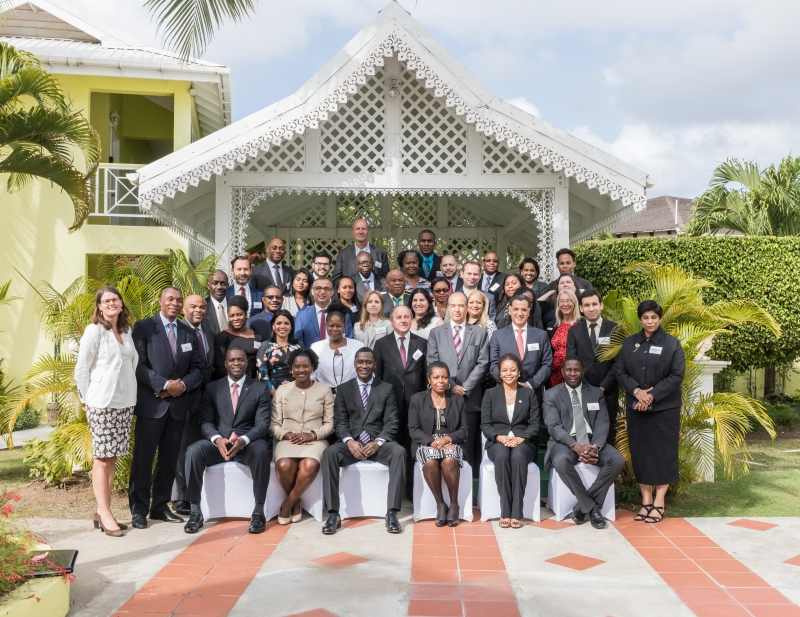CTI’s Caribbean event kindles interest in UNCAT ratification and justice reform
On 4-6 June 2018, 10 Caribbean States* gathered in CTI’s latest regional seminar held in Gros Islet, Saint Lucia, to share good practices and challenges regarding the fair administration of justice and the UN Convention against Torture and Other Cruel, Inhuman or Degrading Treatment or Punishment (UNCAT) and to enhance mutual cooperation.

Together with States from other regions along with international and regional organisations, over 40 participants engaged in in-depth discussions over a three-day seminar, including five Attorneys General/Ministers of Justice/Legal Affairs. The event was jointly organised with Wilton Park.
Discussions focused on sharing good practices and challenges around the fair administration of justice, issues at the heart of the UN Convention against Torture. Sessions covered legal procedures and safeguards to prevent misuse of power by public officials in the contexts of arrest and detention; developing professional standards in policing; prison reform; ensuring the needs and interests of juveniles are taken into account during arrest, custody and interviewing situations; and the roles that monitoring bodies, the legal profession and the judiciary play in maintaining checks and balances.
The rich exchange indicated a strong commitment to the rule of law as well as interest in reforming domestic approaches to minimize risks of ill-treatment and miscarriages of justice. Head of CTI Secretariat, Dr. Alice Edwards, emphasized that “A State does not need a perfect human rights record to ratify UNCAT. Rather, UNCAT ratification and implementation are best seen as part of an ongoing journey to bring political and practical changes on the ground.” The importance of identifying the underlying causes of incidents or more systemic problems was highlighted, taking account of the legal, cultural, political, economic and social reasons that allow negative practices to persist.
The Bahamas’ Minister of Legal Affairs, Hon. Ellsworth Johnson, the newest State to ratify UNCAT, spoke to why a small country would take on the additional burden of such a UN Convention, with the international scrutiny that would necessarily be involved:
“The short answer”, he said, “is to help to make a better Bahamas: to create a society that in every aspect of life obeys and adheres to the rule of law; a society where human rights and human integrity is accorded respect; to help to create a truly civil society.”
Also speaking during the event, the Attorney General of Jamaica, Hon. Marlene Malahoo Forte Q.C., M.P., noted that:
“The decision by the CTI to reflect on frameworks and procedures to ensure effective and fair administration of justice […] recognizes that true justice cannot exist in an environment where torture and other forms of cruel, inhuman or degrading treatment or punishment are present. As Attorneys-General and Ministers of Justice/Legal Affairs we are the guardians of the human rights of all persons under our jurisdiction, including those in the custody of the State. We must recognize that justice is delivered not only in our courts, but through the entire system of law enforcement and all its procedures.”
Participants were exposed to the role that the Convention can play in assisting States in identifying solutions as well as to progressively improve their systems for the administration of justice. They discussed the need for a change of mindset through political and senior-level buy-in. To this end, several proposals were put forward such as: holding national consultation processes engaging the citizenry and the media; providing training and capacity-building focusing on the practical elements of implementing the Convention; appropriate recruitment and vetting procedures, promotions systems and adequate salaries for police and prison staff; clear rules on accountability, discipline and command responsibility of public officials; taking into account vulnerabilities of persons who come in contact with public authorities and in this regard, ensuring diversity within police and prison personnel; and putting in place legal and procedural guarantees to reinforce the independence of the judiciary, prosecutor and oversight bodies.
CTI wishes to thank Wilton Park for co-organising this regional seminar with us.
The event agenda is available here. A full report of the event will be posted soon.
The welcome remarks delivered by CTI Ambassadors HE Mr. Eduardo Bonilla Menchaca, Ambassador of Chile in Jamaica and concurrent in Saint Lucia, Antigua and Barbuda, Bahamas, Dominica and Saint Kitts and Nevis and HE Mr. Ramses Joseph Cleland, Permanent Representative of Ghana to the United Nations in Geneve, are available here.
Please see our earlier press release, “CTI’s Caribbean event opens with the Bahamas becoming the newest UNCAT State party!”, 5 June 2018, accessible here.
* Participating Caribbean States were Antigua and Barbuda, the Bahamas, Barbados, Belize, Dominican Republic, Grenada, Guyana, Jamaica, Saint Lucia, and Saint Vincent and the Grenadines.
The event was also attended by CTI core States of Chile, Denmark, Ghana and Morocco, along with representation from the UN Committee against Torture, the Commonwealth Secretariat, the Organisation of Eastern Caribbean States, OHCHR, The Redress Trust and national human rights institutions/ombudsman and independent police complaints authorities. Also sharing their experiences were Argentina, Fiji, Mexico, São Tomé and Príncipe, the Seychelles, the United Kingdom and the United States.

